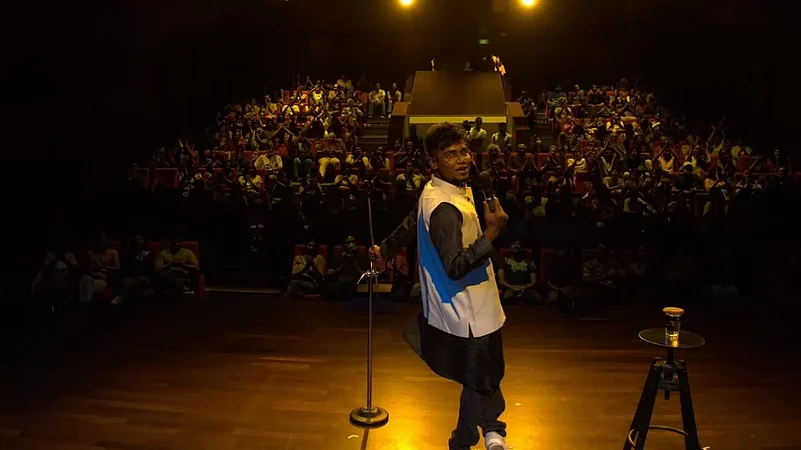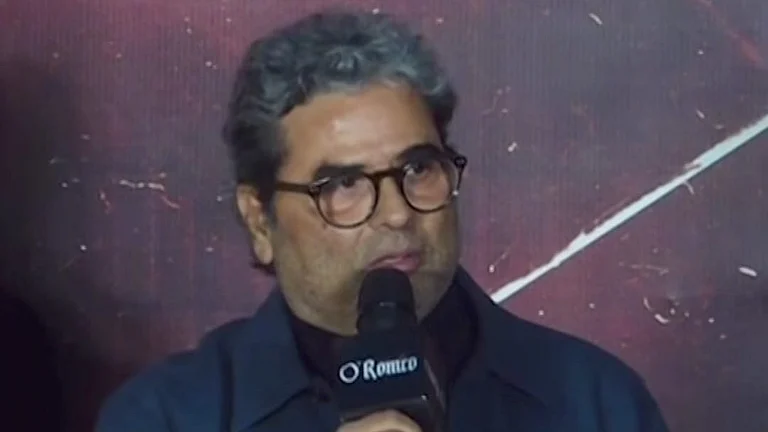I never talked about politics. I couldn’t talk about anything else even if I tried to. I don’t have ‘cool’ stories to tell about school like boy’s hostel or Tinder tales, that other comedians have. I can’t just lie about my experiences to make it funny. My experiences were about people like me, who got bullied by students, who had teachers reminding us that we’re here only because of reservation. They used to mock us saying, “Oh, you’ll drop out after 8th standard”. And that’s what most kids would do because they had to take care of their families.
I come from a small village on the border of Chhattisgarh and Odisha (present day, divided between Kondagaon and Nabarangpur), that got split during the division of Bastar district. My grandmother was a Bangladeshi refugee who came to India during the 1971 Bangladesh Liberation War and decided to find her home in Bastar. Back when I was young, Naxal attacks were a huge issue. When I was in school, my dad once escaped a land mine explosion. But he had a dark sense of humour, as did my Dadi (paternal grandmother). One day, my dad while coming home from work said that he escaped death by mere minutes. He had traversed a road in which a car, just 10 minutes after he crossed the area, stepped on a land mine and blew up. But he joked to us that he would've been happy even if he died that day because he was sleeping in the passenger seat of the car. So he would not have even known. And you see, those casual jokes of his were where I get my sense of humour from.
I have been doing comedy for six and a half years now and only recently did I get the recognition as the first Dalit comedian to actually be talking about Dalit matters. But from the inception, this is the kind of material I have been using at my shows because my experiences are surrounded by it.

I didn’t have kindergarten life, I led the Anganwadi life. I had a Dalit life. So whenever I talk about my experiences, it is bound to be centred around caste. And in India caste is still a topic of shame, it’s still a taboo and that gets politically interpreted.
This is my second tour. During my first India tour, my audience was mostly scholars, journalists, and lawyers who were curious about not my jokes but about the issue. This time, I have had a bigger demography with actual comedy fans, from young to old. People from different backgrounds are now coming to my shows, not ones who want to hear a social commentary on Dalit issues but people visiting just for the sake of the art form, for comedy.
My motive has always been that 50 per cent of the people should be laughing and the other 50 per cent should feel really horrible about what they are hearing. I also purposely ask Dalit people not to attend my shows because they know the struggles inside out. I want people from outside to watch my shows. And I’ve seen some upper caste people taking offence on behalf of Dalit people.
Dalit people have gone through so much that they find humour in it now. I don’t want people to come to my shows with seriousness or sadness. I think I'm a really cool guy and I want people to look at me like one of their favourite ‘cool’ comedians. People often look at Dalit issues with sorrow, and Dalit people with sympathy. And sympathy is often beneath one's actual value. When people see others as equals, they relate to it and then it becomes empathy. That is also what Baba Saheb Ambedkar advocated. And that's what I want so I make my Dalit experiences.
There aren't a lot of rural comedians in India and even if there are, they must have a better background or been to better schools. I'm the first Dalit comedian from rural India. Other comedians can talk about laziness but growing up, I couldn't afford laziness. So I can't talk about it. And you see, nearly 80 per cent of the entire population is dealing with the same problems. So they can relate to my problems. Even comedy fans, who usually come from cities and do not belong to that population, cannot ignore my problems because they also know it is the reality.
Choosing Dalit History Month was always a conscious decision. I started both my tours on April 14, on Baba Saheb’s birthday. And no matter what I talk about, it will always be about Dalit issues because my life is centred around my caste; because it is my life experience. And just as Baba Saheb spoke about the oppressed voice, it is our right to talk about our experiences. You don’t have to give it to us, we already have the freedom.
(As told to Sharmita Kar)





















